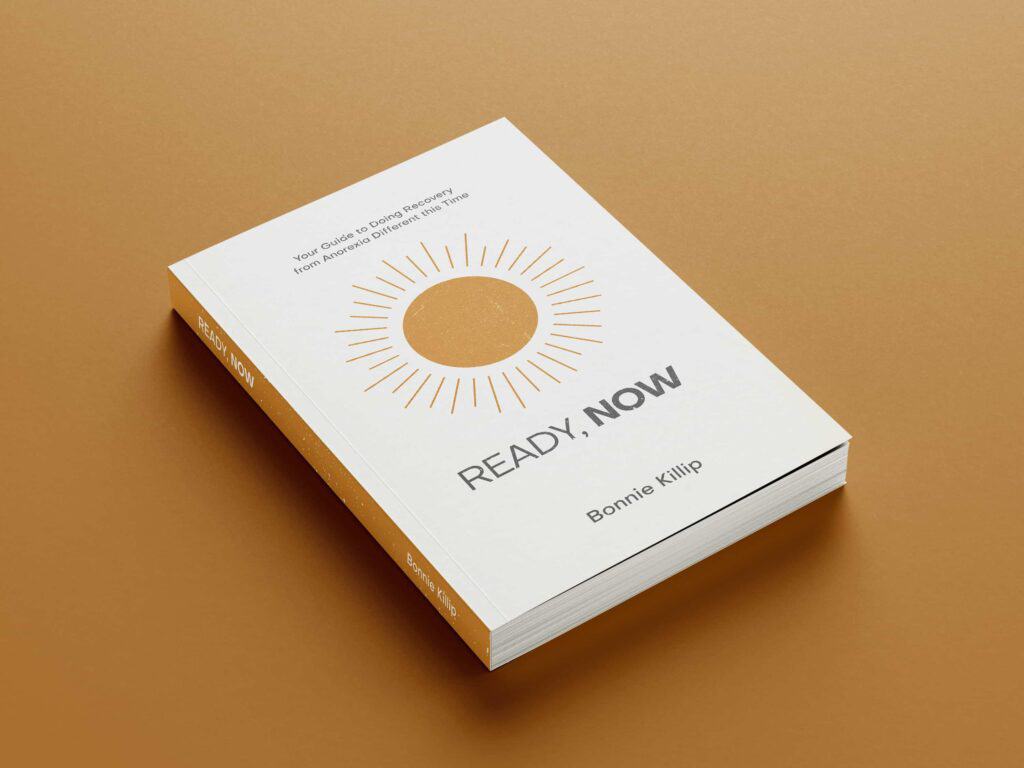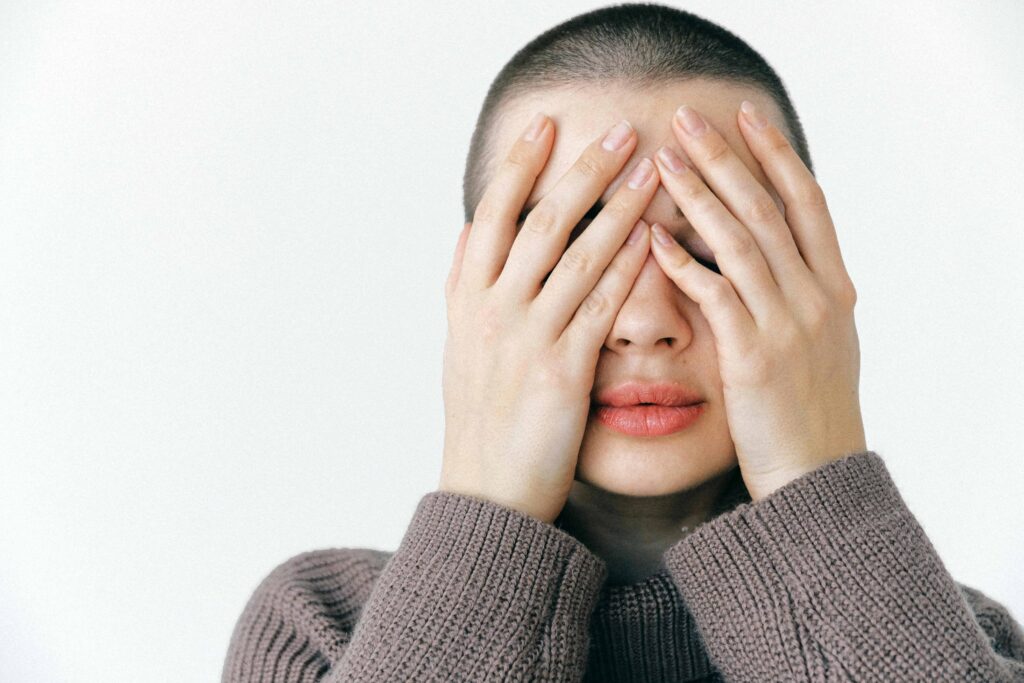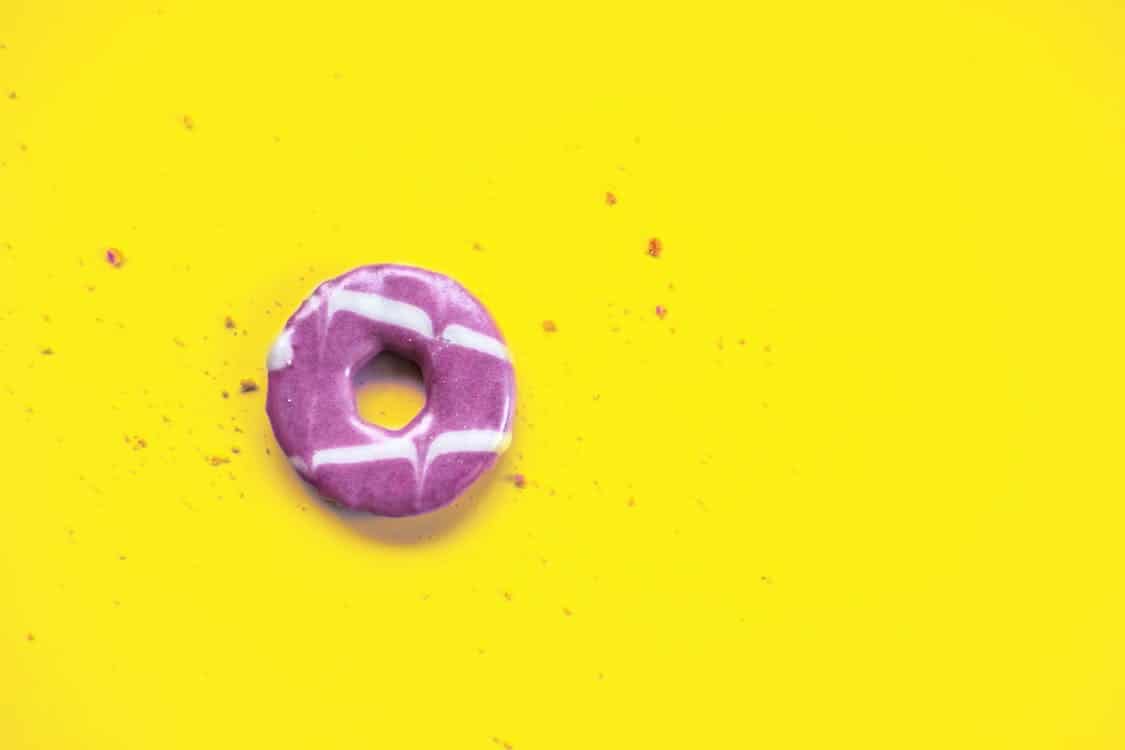Last month I was presenting on eating disorder treatment to a group of clinicians working with inpatients (patients in hospital for eating disorder treatment).
Within the many topics I touched on I brought up a few examples of how I believe we could better deliver treatment to those in recovery – even in the hospital setting where someone is acutely unwell and the number one priority is to get them medically stable (aka to not die) and even when they don’t want to be there.
One example I gave was insight into how the nutrition protocol is communicated with and provided to patients in hospital. I want to say that I am not talking about changing the protocol as the protocol at this stage likely is unchangeable and for good reason – it is intended to keep people alive.
My Experience in the Hospital Bed

About eight years ago now I was that patient in the hospital bed. One of the ones that didn’t want to be there.
To say I was terrified is an understatement.
I was a long way from home, friends and family. I had gone through and was going though some wild things in my personal life. My mental health was at rock bottom and according to every machine I was hooked up to my physical health was hanging by a thread.
I felt almost invisible and somewhat like my body was the centre of some weird science experiment poked and prodded at what seemed like unnecessary levels.
I was spoken at but never with.
I was spoken about but never to.
I was told how things would go.
And the way that things would go was that if I refused to eat (for example the sandwich for lunch) I would be made to have the supplement drink and if I refused to drink that I would be forced to have a nasogastric tube put in (a tube that goes through your nose, down the back of your throat and delivers liquid nutrition straight into your stomach).
As I said this is protocol. This is the way it goes. It is necessary that someone in recovery from an eating disorder and who is medically unstable gets adequate nutrition and the truth is people aren’t always able to do that through eating food alone. Therefore, we have other options.
Only they were never presented as options.
The way it doesn’t have to go is the way it was communicated to me (and to many others now that I’ve heard the stories of many others who’ve been through hospitalisation with an eating disorder).
It was delivered as a threat.
There are no two ways about it the information that a meal replacement drink or a nasogastric tube would be the outcome if I refused to eat the food was never intended to sound like anything other than a punishment for not eating.
My mind reels even as I recall this. Call me crazy but I don’t think it takes a genius to realise that punishing someone who is already living in hell and experiencing food as an awful bad thing is not a way to get them out of that hell and to experience and understand food as a good thing…
At the time I was so terrified and acutely unwell, and it hurts me to say it expectant and used to being treated in less than ways that I blamed myself for how horribly I took the information about this protocol (internally that is, I doubt I expressed anything externally as I struggled to even start eating the sandwich limp in front of me – filled with foods I hadn’t touched for a long time).
What I Understand Now

Today as a much stronger, more empowered and self-compassionate version of myself I can see the truth.
The truth is it was delivered as a punishment.
The more fearful and uncertain version of myself tried to place the blame on myself in how I felt but truly the delivery was never intended to make me feel good. It was intended to make me feel bad.
And that’s what I felt.
Meal replacement drinks and the nasogastric tube were both things that were terrifying to me at that point in time. Therefore, those in positions of power (health professionals) rightly thought that if they delivered that threat, I would do all I could to avoid them. I sure did. I ate the food through the tears, through the self-loathing, through the pain that I still don’t have words to describe.
What they didn’t take into consideration and what I didn’t take into consideration until many years later reflecting on and sharing my story was how that didn’t support healing.
And isn’t healing the whole point of the delivery of said nutrition interventions?…
Isn’t healing the whole point of being in hospital for treatment for an eating disorder?…
In our huge healthcare systems where bureaucratic systems and protocol rule and those delivering care are tired and overworked, I have no doubt it is sometimes easy to lose sight of the goal of the treatment within the delivery of the treatment… (read that again if you need it is a weirdly worded sentence).
It is not about pointing blame and fault (even though I know that sometimes there are people to blame, this is true) and instead to recognise and learn that there are other and better ways of doing things than how we’ve been doing them.
And when we know there are better ways of doing things to be a part of doing them.
How I Wish it was Handled

At the training day that gave me the inspiration for writing this particular blog when I shared how I thought the information on how nutrition would be delivered during hospitalisation (I’ll put this below) I was met with the statement “but it is meant as a punishment”. “When the worst thing they can imagine doing is drinking the supplement the treat of having to do that if they don’t eat the food is supposed to be the reason they eat the food”.
So, yes, I know it was intended to be delivered as a punishment to my past self, for people right now and likely for people in the future undergoing eating disorder treatment (this blog, my work and the work of many others hopefully contributing to that ending however).
The person who said this had lost sight of the real reason
Yes, the supplement and the nasogastric tube are registered as punishments/threats by the person struggling to eat BUT and this is a huge BUT that is not the reason why we deliver them
We have them as options to go to when the person is incapable of consuming the food.
Food first then we do what we can do to HELP (not punish) the person to get the nutrition they so desperately need and deserve.
The supplements and the nasogastric tube are there as backup in supporting this person to do something that is impossibly hard for them to do.
The supplements and the nasogastric tube are there as backup in supporting this person to heal.
The goal is to help this person along this part of their path of healing.
I wish someone had taken a moment to validate that I was struggling.
I wish the information about how nutrition would be delivered was communicated with me something along the lines of…
“I can see this is really hard for you if you truly feel it is not something you can do right now there is the option of having a supplement instead, if that feels undoable today then the nasogastric tube might help you get the nutrition your body needs and you can give the food another go at your next meal”.
There are so many different variations on how I could write this. It’s not perfect by any means but the goal is not to be perfect. The goal is to be human, solid, stable and honest in our delivery of care.
What do you notice about the wording of this delivery versus what I shared previously?
To start it’s genuinely not that different.
The same protocol is followed.
The same nutrition provided.
What is different is its delivery.
Firstly food, supplements and nasogastric tubes are talked about as though they are good things.
News flash – because they are!
Secondly, the person is validated in their struggle. Notice there is no use of the word “refuse” or any other wording that puts the person at blame. They are not to blame for living with an eating disorder.
How Can We Use This Information?

I’m not talking about changing the systems or the protocol for eating disorder treatment within the hospital setting. That is a conversation for another day. I am not talking about giving people the choice to choose to have the food or the supplement or the nasogastric tube or choose to not have them because even though I cannot connect to how it must have felt I know that had I been given a choice I would have chosen none of the above. I also know and this feels strange to write but I know it is true that had I been given a choice of eat the sandwich or choose death that I’d have chosen death.
That is the reality of what we are working with when we are working with people in recovery from eating disorders. So, yes, I do agree that the protocols are necessary. They save lives. They likely saved my life. I am grateful for the medical system and that this treatment was available to me and is available to others. My argument is that it could have been delivered in a way that fostered hope and empowerment instead of trauma.
And yes, I have recovered and moved on and it is now a distant memory that does not affect my sense of self nor my worth but I do wonder if that could have been much quicker had I had the type of treatment I am talking about.
I do wonder if others less fortunate than me who don’t have the support I had around me post hospitalisation – family and friends wise but also the treatment I found that changed everything (clinical hypnotherapy).
I can see and I have seen how hospitalisation experiences could crush a person beyond repair and that’s not an easy thing to write but it is true. I see in my practice many clients who have had one or more traumatic hospitalisation or medical related experiences and never sought help again. That should not be the outcome of treatment that is intended to be life saving (and is lifesaving).
The treatment is necessary. Thet protocol likely useful for the most part therefore, what I am talking about is changing the communication and delivery of treatment.
If you are working in the treatment of those in recovery from eating disorders and you believe that it is possible to punish your patients out of doing eating disorder behaviours the truth is you are likely right. To a degree.
But the deeper truth is even if that is achievable, and someone is able to refrain from doing an eating disorder behaviour for fear of punishment this is not the same as someone becoming empowered enough to choose to no longer do that behaviour because they no longer feel the need to do that behaviour.
Refraining from doing a behaviour is not recovery and it is certainly not recovered.
I’ve written about how eating disorders are not a choice before and it’s likely something I’ll keep writing about until this knowledge truly becomes a given of treatment. How can we punish someone for doing something they are not choosing to do? This is presupposing they are choosing to do…
More Fuel to the Fire

Something my mum shared with me only recently was that a therapist I had seen during my younger years of living with an eating disorder while I was still living at home with my parents had advised my mum to punish me for the eating disorder behaviours I was doing.
My mum had never shared this with me before but on this day for whatever reason she chose to (we must have been discussing something related for the topic to come up, but I’ve forgotten what).
I’m grateful she chose to share this because what she also went on to share was her thoughts at the time about this recommendation and it is likely the most relatable thing for parents who find themselves in the almost unbelievable position of trying to help their child not only not die from an eating disorder but regain their life, energy, vitality and personality (the eating disorder takes all that away).
She said her thoughts were a somewhat astonished, “What? I am supposed to punish my child for being sick?”
Let that sink in.
Where on earth else in our healthcare system do, we think it’s a great idea to punish patients?…
Yet, that is what we are doing to people with eating disorders.
That has been and I have to say still is a part of treatment.
If you think I was just unlucky, and we found a therapist who was an exception we didn’t. The therapist I am talking about who recommended punishment to my mum was not just an anybody therapist she was an “eating disorder specialist”.
I cannot even imagine how harmful it would have been to my younger self had my mum taken this advice.
My younger self who was already beyond lost and so untrusting of the world to the point where I wasn’t even sure I wanted to be a part of the world (and the therapist was well aware I was suicidal).
I cannot even imagine the damage this (likely well intended and certainly well intentionally delivered by lost parents) advice has, is and will continue to cause.
I want to be clear no one has ever in the history of the universe been blamed, shamed, punished or threatened out of an eating disorder.
Recovery from an eating disorder takes guiding the person in recovery from an eating disorder towards their own self-empowerment and self-acceptance because this is the only way they are going to create and experience any level of lasting recovery and most importantly live a life beyond an eating disorder.
The point of eating disorder treatment is not to make people feel shamed or pressured into eating (they already live in this hell in their minds. Believe me. All I ever felt when I lived with an eating disorder was shame, self-blame, guilt and confusion as to why I couldn’t change). The point of eating disorder recovery is to help people break free and open up their choice to choose.
When people are happy, healthy and well-functioning they do not choose to starve themselves.
Eating disorders are not a choice, they are an inability to cope in a more functional way in a difficult world.
Let’s be a part of helping people living with eating disorders develop the skills and resources to cope in more functional ways, let’s be a part of helping them feel that while it is undeniable that the Earth is a difficult place to live it is also a friendly, loving and caring place. Let’s not be a part of making the world more difficult and unfriendly.
Summary

It’s unlikely if you’ve read this far that you need me to give a yes or no answer to whether punishment has a place in eating disorder treatment, but I am going to end with the one-word answer so it is clear and the answer is – no.
There is another question my answer is also no to and that is whether people who believe punishment has a place in eating disorder treatment should be working in eating disorder treatment.
No.
No one has ever healed from a broken arm by being punished out of it.
No one has ever healed from an eating disorder by being punished out of it.
Neither of these ailments are choices and we must stop acting as if eating disorders are a choice (while paying lip service to them not being a choice – see my earlier blog “What Does It Mean When We Say Eating Disorders Are Not a Choice?”).
Yes, eating can be seen as a punishment in eating disorder treatment, supplements and nasogastric tubes even more so only because of how much fear the person in recovery holds towards those things. It is not however true that any of those things are inherently a punishment or should be even thought about as punishment. They’re not. They are lifesaving and lifegiving amazing things that are there only to support the person in regaining their health.
The whole idea of recovery is that this person comes to be ok with food. How could something that is reinforced as a punishment ever be something they could learn to be ok with?…
If you’re not sure how to work with those in recovery or help your loved one in recovery in a way that doesn’t include punishment (acknowledging those who work from the place of supporting or delivering punishment often do so with good intentions – they want the person to recover) please get in touch with people with lived experience. Lived experience is people who’ve lived with and recovered from an eating disorder.
Please learn from those who’ve done it how to do it.
There are a number of organisations who include those with lived experience in their trainings (In Queensland Australia we have a great one called Eating Disorders Queensland or EDQ).
You can also find these people privately.
Or if you don’t want to look any further, I am one of those people happy to help you update or bring your understandings and practical skills in the care or treatment you deliver to those in recovery from eating disorders to the next level.
Please do not undervalue your ability to make a difference.
Parting Thoughts

I’ve Included the following quote in my book – “Ready, Now: Your Guide to Doing Recovery from Anorexia Different this Time” because I think it encapsulates how recovery from an eating disorder can all to often feel.
The quote says “child”, but I think it equally applies to us all and perhaps no one more so than someone in recovery from an eating disorder being punished or “forced” to do what they are terrified to do…
If we continuously try to force a child to do what he is afraid to do, he will become more timid and will use his brains and energy not to explore the unknown but to find ways to avoid the pressures put upon him.
~ John Holt
Eating disorder recovery is about exploring the unknown. Therefore, we need to let go of forcing and punishing and instead focus our energy and time on resourcing people up so they become increasingly safe and capable to explore the unknown more and more and more, until the unknown becomes the known.
With my whole heart I hope you found this information valuable.

Become Great. Live Great.
Bonnie.



